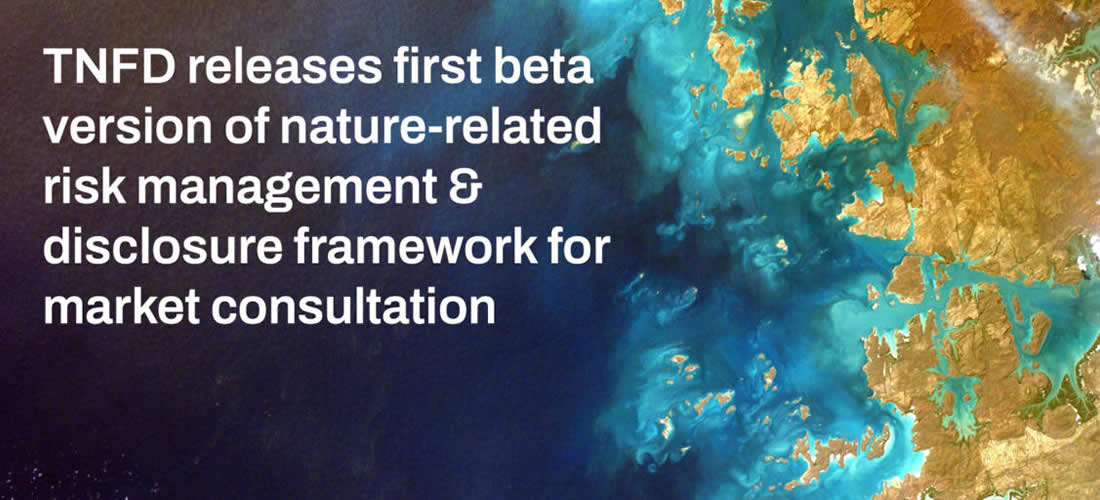Geneva/London, 15 March: The Taskforce on Nature-related Financial Disclosures (TNFD) has today released the beta version (“version 0.1”) of its risk management and disclosure framework for nature-related risks and opportunities. The version 0.1 of the TNFD framework is open to public consultation following TNFD’s open innovation approach.
TNFD, the World Business Council for Sustainable Development (WBCSD) and other TNFD partners are seeking market actors to provide feedback on this first iteration of the framework and to continue working with the TNFD and its partners to pilot and test the framework. The prototype framework marks the beginning of an 18-month process of consultation and development with a broad range of market players and stakeholders before the release of the Taskforce’s final recommendations at the end of 2023.
15 out of the 34 TNFD Taskforce Members are WBCSD member companies, who celebrate the release of version 0.1 of the framework as a first step towards supporting a standardized way of communicating and demonstrating business action on nature.
WBCSD has supported the TNFD alongside 12 other leading science and industry bodies as a TNFD Knowledge Partner by bringing to the fore WBCSD members’ experiences and expertise in developing credible nature-positive strategies and operations across value chains, as well as in establishing risk management and disclosure practices in line with TCFD recommendations. WBCSD will liaise with real economy actors and financial institutions to help pilot the TNFD framework under WBCSD’s workstreams on Nature Action and Redefining Value, core elements of its Strategy 2022-2027.
“At Nestlé, we are committed to helping drive a just transition towards regenerative food systems at scale. That’s why we support TNFD’s work in helping organizations better understand their dependencies and risks related to nature and we welcome this first iteration of the framework.” said Alison Bewick, Head of Group Risk Management, Nestlé S.A.
“The TNFD beta Framework is another important step towards completing financial institutions’ picture on nature related risks and opportunities,” said Nora Ernst, Senior Sustainability Risk Manager, Swiss Re.
The first beta version of the TNFD framework comprises three components:
- Foundational guidance, including key science-based concepts and definitions, to help a wide range of market participants understand nature, and nature-related risks and opportunities;
- Disclosure recommendations aligned with the approach and language of the climate-related guidance developed by The Task Force on Climate-related Financial Disclosures (TCFD); and
- Practical guidance on nature-related risk and opportunity analysis for companies and financial institutions to consider incorporating into their enterprise risk and portfolio management processes.
In recognition of the interlinkages between climate change and nature loss, TNFD’s disclosure recommendations build on work done by the TCFD, adopting the same four-pillars and aligning its high-level disclosure recommendations as much as possible. This is a response to calls from market participants for a consistent approach and language across sustainability reporting.
The beta framework is also designed for future alignment with the global baseline for sustainability standards under development by the International Sustainability Standards Board (ISSB) while providing flexibility for those organizations that wish to, or need to, report to different materiality thresholds and regulatory requirements.
Dependencies and impacts on nature are inherently local, which is why consideration of location is an important feature throughout the TNFD Framework. The beta release of the framework proposes a new location-specific disclosure and provides guidance on how market participants can begin to incorporate location-based nature-related dependencies, impacts and risks into their enterprise and portfolio risk management processes.
A further three iterations of the beta versions are planned for release in June 2022 (v0.2), October 2022 (v0.3) and February 2023 (v0.4). This will culminate in the final release of the TNFD’s recommendations (v1.0) planned for September 2023.
Access the beta version 0.1 of the TNFD framework, open for public consultation, here:
https://framework.tnfd.global/
Source: www.wbcsd.org
 En
En Cs
Cs